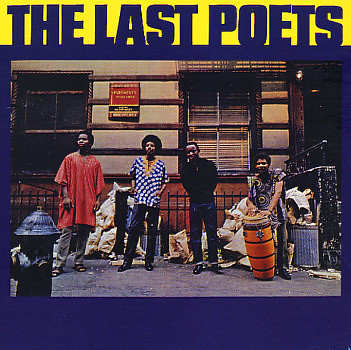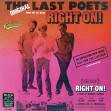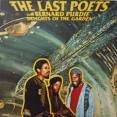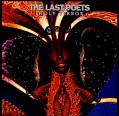Islam is at the heart of an emerging global anti-hegemonic culture that combines diasporic and local cultural elements, and blends Arab, Islamic, black and Hispanic factors to generate "a revolutionary black, Asian and Hispanic globalization, with its own dynamic counter-modernity constructed in order to fight global imperialism. (say what!)
Sunday, May 15, 2005
on the beach with dave chappelle
On the Beach With Dave Chappelle
Posted Sunday, May. 15, 2005
In this week's TIME, Christopher John Farley reveals why Dave Chappelle decided to leave his hit show and what he's been up to since he disappeared to South Africa two weeks ago. Last Friday night, TIME Johannesburg bureau chief Simon Robinson met with the comic at uShaka Marine World on the beach in the South African port of Durban. In a ninety minute conversation, Chappelle was eager to set the record straight on why he suddenly left the U.S. and what he's doing in South Africa. Here's Robinson's account:
Dave Chappelle shows up to our interview in a red t-shirt, blue jeans and shiny white sneakers. He lopes around in his usual style, pacing a lot, but does not seem like a man struggling to speak or to order his thoughts at all. He's lucid and thoughtful and a couple of times asks me to give him some time to think about answers. He concedes that he is dealing with a lot of issues and mentions that he had consulted a psychiatrist about a week ago for a forty minute session. He is also quite fastidious about keeping his new sneakers clean and stops at least twice to wipe smudges off their toes.
The first thing Chappelle wants is to dispel rumors—that he's got a drug problem, that he's checked into a mental institution in Durban—that have been flying around the U.S. for the past week. He says he is staying with a friend, Salim Domar, and not in a mental institution, as has been widely reported in America. Chappelle says he is in South Africa to find "a quiet place" for a while. "Let me tell you the things I can do here which I can't at home: think, eat, sleep, laugh. I'm an introspective dude. I enjoy my own thoughts sometimes. And I've been doing a lot of thinking here."
The picture he paints—and it seems a fairly honest and frank assessment— is of someone struggling to come to terms with a new position and power who's still figuring out how to come to grips with how people around him are reacting to the $50 million deal he signed last year with Comedy Central. Without naming specific characters, he seems to blame both some of his inner circle (not his family) and himself for the stresses created by last year's deal.
"There were things that overwhelmed me," he says. "But not in the way that people are saying. I haven't spent any of the money. All that stuff about partying and taking crack is not true. Why do I live on a farm in Ohio? To support my partying lifestyle?"
The problems, he says, started with his inner circle."If you don't have the right people around you and you're moving at a million miles an hour you can lose yourself," he says. "Everyone around me says, 'You're a genius!'; 'You're great!'; 'That's your voice!' But I'm not sure that they're right." And he stresses that Comedy Central was not part of the problem and put no more than normal television restrictions on what he could do.
"You got to be careful of the company you keep," Chappelle says. "It's hard to know how much to say. One of the things that happens when people make the leap from a certain amount of money to tens of millions of dollars is that the people around you dramatically change.
"During my ascent, I've seen other people go through that wall to become really big. They always said that fame didn't change them but that it changes the people around them. You always hear that but you never really understand it. But now that I'm there that makes a lot of sense and I'm learning what that means. You have to have people around you that you can trust and aren't just out for a meal ticket."
The breakdown in trust within his inner circle seems to have led him to question the material they were producing. He seems obsessed with making sure the material is good and honest and something that he will be proud. "I want to make sure I'm dancing and not shuffling," he says. "What ever decisions I make right now I'm going to have live with. Your soul is priceless." The first two seasons of his show "had a real spirit to them," he says. "I want to make sure whatever I do has spirit."
But Chappelle also says that he must share the blame for the stalled third season. "I'm admittedly a human being," he says. "I'm a difficult kind of dude." His earlier walkout during shooting "had a little psychological element to it. I have trust issues, things like that. I saw some stuff in myself that I just didn't dig. It's like when I brought a girl home to my mom and it looked as if my mom really didn't like this girl. And she told me, 'I like her just fine. I just don't like you around her.' That's how I feel in this situation. There were some things about myself that I didn't like. People got to take inventory from time to time. That's what this [coming to South Africa] is for."
This is Chappelle's second trip to South Africa. He first came to Durban, and visited Salim, in 2000. Chappelle won't tell me exactly how he met Salim but describes him as a family friend. A soft-spoken Muslim, Salim seems also to be something of a sounding board to Chappelle, who converted to Islam several years ago. While Chappelle is not doing a formal religious course in Durban, says Salim, who wore a simple cotton robe and hung back through the interview and photo shoot and only spoke when I asked him a question, "if he wants to talk religion then I'm there as someone to talk to." Says Chappelle: "This is kind of my spot where I can come to fill my spirit back up. Sometimes you neglect these things if you are running on a corporate schedule." The crux of his crisis seems to boil down to his almost obsessive need to "check my intentions." He uses the phrase a few times during the interview and explains that it means really making sure that he's doing what he's doing for the right reasons.
His family, he says, has been a huge support over the past eight months. "They've been phenomenal really, just incredible. What beautiful people. Everyone loves their family but it's good if you can like them too."
His religion is also crucial. "I don't normally talk about my religion publicly because I don't want people to associate me and my flaws with this beautiful thing. And I believe it is a beautiful religion if you learn it the right way. It's a lifelong effort. Your religion is your standard. Coming here I don't have the distractions of fame. It quiets the ego down. I'm interested in the kind of person I've got to become. I want to be well rounded and the industry is a place of extremes. I want to be well balanced. I've got to check my intentions, man."
That includes planning for the future. When I ask him if he would ever buy a place of his own in South Africa, Chappelle replies, "First of all I've got to make sure I've got a job."
He says that he's only been recognized five or six times in the two weeks he's been here. "It happens so sporadically that when it does it freaks me out because I have to remember, 'Oh, yeah, I'm famous.'" At the end of our interview/photo shoot an American woman does recognize him. "Number seven," he cries. "Wow, I'm not that big in Africa. I've got to do an action film here."
During most of the hour and a half that we talk, Chappelle is serious and introspective. But he still has his sense of humor, which comes out as we near the end of our conversation: "Is that enough to prove I'm not smoking crack or hanging out in a mental institution?"
interview with safiya bukhari
dhoruba bin wahad
At present, Dhoruba Bin Wahad lives in Accra, Ghana where he continues organizing and writing especially on Pan-Africanism and the prison system.
I found a number of interesting links related to his life and activities.
An open letter to Al Sharpton from June 2004
interview with Dhoruba Bin Wahad and Bill Weinberg in 1995
Dhoruba himself wrote Toward Rethinking Self-Defense in a Racist Culture: Black Survival in a United States in Transition from the book "Still Black, Still Strong --Survivors of the War Against Black Revolutionaries" (about Assata, Dhoruba and Mumia)
He also wrote The Siege of Fallujah, Iraq: Another Page in the West’s Long Running War with Islam
Summaries of the cases of several imprisoned political activists (along with Dhoruba Bin Wahad, there is some information on Leonard Peltier, Geronimo Pratt, Mumia Abu Jamal and Marshall Eddie Conway). At this time, Dhoruba Bin Wahad and Geronimo Pratt are the only ones who have been released.
There is a VERY bizzare and VERY eclectic book available free online called The Ibogaine Story: Report on the STATEN ISLAND PROJECT Ibogaine is an experimental drug which is extracted from a plant used in certain Central African initiation ceremonies. Dhoruba Bin Wahad gets his own chapter of the book as a part of a discussion on the anti-drug activities of the Black Panther Party (and he also appears elsewhere). But seriously, the book goes all over the place, from literature, to politics to biblical criticism, to discussions of gnosticism and science-fiction to the history of agriculture to neurology to pharmocology to quantum physics.
mumia abu jamal - death blossoms

In spite of his name, Mumia Abu Jamal isn't a confessional Muslim. He was part of a spiritual collective known as the MOVE Organization led by John Africa. Nevertheless, in his book (available free online) Death Blossoms: Reflections from a Prisoner of Conscience he meditates on his time in prison and shares the following experience in section called the Night of Power....
In Islam, during the holy month of Ramadan, it is said that one night is holiest of all: al Qadr, the Night of Power. According to Islamic belief, it was on this night that the Qu’ran was delivered to the Prophet Mohammed, and it is thus the holiest of all nights. On this night, prayers are granted “for everything that matters.”
The Night of Power is so deeply ingrained in the Muslim heart that a short chapter in the Qu’ran is devoted to it. It begins, as do all chapters therein, with the exclamation, “In the Name of God, the Compassionate, the Merciful,” and goes on thus:
Verily we have sent this
In the Night of Power.
And what will convey to you
What the Night of Power is?
The Night of Power is better
Than a thousand months:
The Angels and the Spirit descend in it,
By permission of their Lord,
For everything that matters.
It is Peace:
This until the rise of daybreak.
I will never forget the Night of Power that shook me, not during the holy month of Ramadan, but in the hot, humid summer of 1995, when I sat on death row’s Phase II with a date to die.
The sun had set behind the hills of West Virginia amid ominous thunderheads, and now the forces of nature struck like a divine assault team.
Lightning stabbed the earth as if in the throes of celestial passion, and so powerful were the bolts that the lights in the block – indeed, the whole jail – flickered out.
On Phase II, lights are kept burning twenty-four hours a day – bright during the day, dim at night – though in fact “dim” at two in the morning is hardly less than bright at noon. Tonight – for now at least – it was completely dark.
I sat on the cool metal table and looked out into the night. Cell lights, hall lights, yard lights, black lights, perimeter lights, and lights on poles had died, and not even stars broke the black carpet. So dark!
Then: a splash of illumination that bathed the hills in blue light, a rolling boom-BOOM of thunder, and a rapid
procession of blinks as lights went out all over the prison complex. It happened again and again and again, and yet again – one sinuous bolt of lightning after the next forking the black sky, then white-washing it to midday brilliance for the brief space of an eye-blink.
I sat there in the first real darkness since my arrival to Phase II, transfixed by the display of such raw, primeval power. The strikes seemed so close, I felt the hair on my arms rise.
The storm moved westward, over the prison and across the hills, and in its magnificent wake, darkness reigned as man’s lights bowed their mechanical heads to the power it had unleashed.
There I sat in the darkness, with less than a month to live, yet I felt better than any other night I spent on Phase II. I felt better even than I did a few weeks later, the night my stay was granted. Why?
Then it dawned on me, like bright writing etched in my brain:
“Here is true power, my son.
See how easily it overwhelms man’s ‘power’?”
Watching the veins of nature pulse through the night sea of air, making – if only for milliseconds – daylight over the hills, I felt renewed. How puny man seemed before this divine dance!
I saw, then, that though human powers sought to strangle and poison me and those around me, they were powerless. I saw that there is a Power that makes man’s power pale. It is the power of Love; the power of God; the power of Life. I felt it surging through every pore.
Nature’s power prevailed over the man-made, and I felt, that night, that I would prevail. I would overcome the State’s efforts to silence and kill me.
Saturday, May 14, 2005
racial jujitsu or the more things change...
From what I gather, the basic idea is the following: We all know that in 2050 or some other magical date further down the road, white people (according to contemporary definitions) will become a minority in the United States. And the naive view (which I can't say I've completely ruled-out) is that new demographic realities will then force American society to be more inclusive and less racist in certain respects. At the very least, the more extreme forms of white supremacy which depend on majority-rule should be significantly weakened.
The bad news suggested by Yancey is that whiteness (which is a social construction anyway) will then morph in ways which will still be oppressive to Blacks. And that just as in the past other immigrant groups (Irish, Italian, Jewish, etc.) "became" white one after another, in time Asian-Americans and Hispanics will also become "white", and African-Americans will remain excluded.
"pretty sneaky sis"
takin' it to the streets
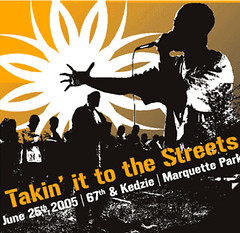
If you are going to be in Chicago on June 25, you should definitely check out Takin' It to the Streets, which is an amazingly positive day-long festival.
Featured Speakers:
Imam W.D. Mohammed, Imam Hamza Yusuf, Imam Zaid Shakir, Imam Siraj Wahhaj, Imam Umar F. Abd-Allah, Ilyasah Shabazz
Featured Performers:
Rock Steady Crew, All Natural, Jurassic 5, Brother Ali, Napoleon, MPAC, Allah Made Me Funny (National Comedy Tour), M-Team, Jamila Fidrause, Kuumba Lynx & Native Lynx
Community Forums and Workshops include:
Unity: Holding Fast to the Rope of Allah
Muslims & Hip Hop - A Forum for Outreach and Activism
Getting Involved with the Day Laborer Campaign (In Spanish and English)
Gender Issues & Islam
The Prophetic Tradition and Working for Social Justice: An Interfaith Perspective
Prisoner Reentry and Public Safety Hearings - IMAN is honored to host this public hearing as part of its work around the issues of recidivism and ex-offender reentry
Co-Sponsored by the Southwest Organizing Project (SWOP) and the Developing Justice Coalition - Please visit the the following link to understand what is entailed in conducting a public hearing:
The main organizers are the Inner-City Muslim Action Network (I.M.A.N.) and you can read about this event and their other projects on their website.
if not us, who?
How does the community organize itself in positive ways? How do we produce appropriate leadership? How do we get better, more effective organizations? Do we need to create flashy high-profile public relations - minded events? Or is it just a matter of encouraging ordinary people to come and do the quiet, non-flashy, anonymous work, and make the small but consistent contributions which improve communities.
I'm just throwing it out there
the last poets
"When the moment hatches in time's womb there will be no art talk. The only poem you will hear will be the spearpoint pivoted in the punctured marrow of the villain....Therefore we are the last poets of the world."
-South African poet, Keorapetse William Kgositsile
The Last Poets were born on May 19, 1968, at a celebration of Malcolm X's birthday. The seven (and seven seems like a fitting number) Black men who at one time or another were a part of the group are: David Nelson, Gylan Kain, Abiodun Oyewole, Felipe Luciano, Umar Bin Hassan, Jalal Nurridin, and the late Suliaman El Hadi.
Several are Muslim, but most are not. One (David Nelson) has become a Christian minister. One (Abiodun Oyewole) helped to found a Yoruba village in South Carolina. Some have re-defined themselves by giving themselves new names. Some have kept the names they were given at birth. The one Afro-Latino member (Felipe Luciano) was a co-founder of the Young Lords Party (a Puerto Rican group modelled on the Black Panthers).
The seven Black men who at one time or another were a part of the Last Poets manifested in themselves a wide and varied expression of the African-American (male) experience, both the positives and the negatives. One such negative is a minor turf war over who even gets to use the name "the Last Poets". Suliaman El-Hadi and Jalal Nuriddin, two Muslim members, have a released a few albums (with more Islamic lyrical content) under the name "Last Poets". But Abiodun Oyewole and Umar Bin Hassan have also released albums, and performed using the name as well (most recently on Def Poetry Jam). I'm not sure if religion was a part of the split between them but the lines seemed like they were drawn that way.
In the book "On a Mission", written by Umar and Abiodun (with Kim Green), Umar
says:I was into the Islamic thing for a while . It touched me, like it touches a lot of brothers who come out of the streets. The religion touches you because the first thing you learn is how to let go of arroogance, indifference, harshness, and coldness. For those who can agrasp the whole idea, it lets you give yourself to your lord and to find your true power.
(Although he later says he became disillusioned with the movement and went back to the streets. This is all before the more recent revival of the Last Poets which some would credit to the release of Umar Bin Hassan's solo album "Be Bop or Be Dead" in the early 90's )
A lot more could be said about the Last Poets and the lives of their members: Their status as the godfathers of conscious hip-hop, their importance as the voice of the 60's and 70's, their connections to the Black Panthers, contributions to Black, Latino, Muslim-American culture, etc.
But here are a few links to give further background information and perspective:
Jalal Mansur Nuriddin's webpage
interview with Abiodun Oyewole an original member of the group
A second interview with Abiodun
general history of the group by Professor R.A.P.
a brief page from This Far By Faith a PBS series about how religious faith acts in people's lives which touched on the Last Poets and Abiodun Oyewole.
a brief biography of Umar bin Hassan
the contrasts between the Last Poets and contemporary hip-hop
The 13 Point Program of the Young Lords from the Sixties Project website
A brief history of the Young Lords
The Young Lords in the context of Puerto Rican gangs in Chicago
siraj wahaj
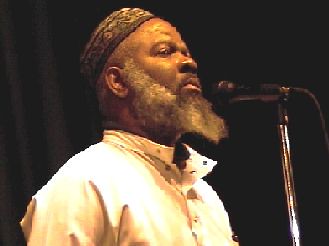
Siraj Wahaj is a well-known African-American Muslim speaker in North America, and a big supporter of Islamic causes. He's currently the Imam of Masjid Al-Taqwa in Brooklyn, New York. Born in New York as Jeffrey Kearse, he became a Sunday school teacher as a teenager, then later went to NYU where he studied Math education. In the 1960's, he became attracted to the Nation of Islam, then later found mainstream Sunni Islam. He changed his name to Siraj Wahaj, which means "Bright Light" in Arabic, and was chosen to receive Imam training at the Ummul Qura university of Mecca in 1978. he also briefly taught a course in Islamic studies at Howard University.
He started his own mosque in 1981 in a friend's Brooklyn apartment. They moved the furniture from the living room to the bedroom so that 25 people could pray toward Mecca. Soon afterward, the congregation, known as Masjid At-Taqwa, bought an abandoned clothing store at a city auction for $30,000 and converted it into a mosque. Today, it is a well-known mosque in New York City.
Imam Siraj has been Vice President of ISNA (Islamic Society of North America) since 1997 and has served on the Majlis Ash-Shura, a consultative council of Islamic scholars, since 1987. He is also a member of the Board of Advisors for the American Muslim Council. He has appeared on several national television talk shows and interviews in America, and was the first person to give an Islamic invocation to the United States Congress.He's well-admired by Muslims in New York at the very least, he led his Brooklyn community in an anti-drug patrol in Brooklyn, New York in 1988, which was a success and put a dent in the drug trade in Bedford-Stuyvesant, and received high praise from the NYPD for his efforts.
He's a fairly prolific speaker, at least in America. He makes many appearances at the major North American Muslim conventions, and numerous forums and lectures in the Northeast US alone. There are many audio lectures given by him in English available online, with titles like "Allah's Word is Supreme," "Are You Ready To Die?" "Confusion of the Ummah," "Control Your Anger," "Easy Way To Paradise," and "Good Or Bad Company:How To Judge."
Friday, May 13, 2005
najee ali and project islamic h.o.p.e.
I just wanted to highlight:
interview with Najee Ali at playahata.com
an interview with Najee Ali at Blackelectorate.com
also, an open letter to Russell Simmons from Najee Ali is available at the Universal Zulu Nation website (along with a whole series of other pieces by activists calling for a more principled take on hip-hop culture).
Thursday, May 12, 2005
remember imam jamil al-amin


A recent conversation made me think about what kind of work (political activism, community services, rehabilitation programs etc.) orthodox Muslims have been doing (or not doing) in the inner cities. And a related question is which Muslim leaders stand out in terms of their stature in urban communities?
One obvious choice to consider is Imam Jamil Al-Amin (formerly H. Rap Brown)
Imam Jamil Abdullah Al-Amin was born Hubert Gerold Brown, the youngest of three children, in Baton Rouge, Louisiana, on October 4, 1943. He acquired the nickname “Rap” from the streets (growing up) as a result of his impressive dexterity with language, combining keen intellect with blunt coarseness.
He attended Southern University from 1960-64. In 1964, he moved to Washington, DC, and became politically involved in the Student Nonviolent Coordinating Committee (SNCC). In May 1967, at the age of 23, H. Rap Brown was elected chairman of SNCC, succeeding Stokely Carmichael.
By 1968, much of SNCC’s leadership had merged into the Black Panther Party for self defense, which had been organized in Oakland, California, by Huey P. Newton and Bobby Seale; Brown would become the organization’s Minister of Justice.
In 1969 Brown’s first book was published entitled, Die Nigger Die! (publ., Dial Press
He is perhaps most famous for his proclamation during that period that "violence is as American as cherry pie".
He was arrested in a shoot-out in 1971 in New York.
He spent five years (1971-1976) in the Attica Prison after a robbery conviction. In prison, Brown converted to Islam and changed his name to Jamil Abdullah al-Amin.
Paroled from prison in 1976, he moved to Atlanta, Georgia, opened a community store and became the Imam (leader) of the Atlanta Community Mosque.
While H. Rap Brown was known for his fiery rhetoric and in your face confrontation, Jamil Al-Amin was known as a quiet, mild-mannered, stabilizing force in Atlanta’s West End community. In the words of 73 year old Hattie Stegall, “I never saw him angry. When someone would die in my family, he would come by and offer his hand. And when the Muslim children would fight my grandchildren, he would make them come to me and apologize.”
Imam Jamil would grow to lead a national community of Muslims, with members scattered around the US and Caribbean.
When Jamil Abdullah Al-Amin moved into Atlanta’s West End, it was reportedly a crime ridden section of the city known for prostitution and drug proliferation. Under Imam Al-Amin’s leadership, Muslims led a renaissance which has resulted in the West End becoming a source of pride for the city of Atlanta. Despite this, however, the Imam’s past coupled with his [Islamic] ori entation would serve as a lightning rod for additional struggle.
On August 7, 1995, Imam Jamil Al-Amin was arrested in connection with the July shooting of a young man who was pressured by authorities into identifying Al-Amin as his assailant. Even members of Atlanta’s Police Department openly expressed amazement when agents of the FBI, the FBI’s Domestic Counterterrorism Task Force and the Bureau of Alcohol, Tobacco and Firearms became involved in a case that the police themselves described as “a routine aggravated assault.” The charges were later proved unfounded and dropped.
In 2002, he was found guilty of killing a Fulton County, Georgia sheriff's deputy and wounding another in a gunbattle at his store. He was sentenced to life imprisonment. (The nature of the evidence against the imam is questionable, and you can read more about the case in the links below)
Just some background on Imam Jamil Al-Amin's case:
from the Student Alliance for Imam Jamil the Peace and Justice Foundation and the Unofficial Website on Imam Jamil Al-Amin and here is another summary of Jamil Al-Amin's life and impact on his community.
Actually, the Peace and Justice foundation website also has a number of links dealing with some past and recent political questions of possible interest to Muslims in the US as well (Amina Wadud, Sudan, the Diallo shooting, the US presidential election, etc.)
Wednesday, May 11, 2005
millions more marching
Trying to be a Muslim
Not the five, but the hundred percent
I repent, because only God is perfect
I make a mistake, a double-take, a retake,
intake forgiveness, mercy from the Merciful
Never find pork on my fork
or beef on my plate
I relate to all that's in existence
don't give me no resistance
don't test me
the cops, they can't arrest me, because I don't do nothing shady..
Malcolm was played by the Nation
slayed by the Nation
I think we've been delayed by the Nation
A million men facing all in one direction
Common called it resurrection
but I don't see the ascension because
The ghetto is still the ghetto
The man is still the Man
A snake is still a snake do you think you can understand why
The ghetto is still the ghetto
The man is still the man
A snake is still a snake so can you help me understand.
And the rest is hip-hop non-history...
I'm sharing because the 10 year anniversary of the Million Man March is coming up and Farrakhan is planning another gathering on the mall under the umbrella of the Millions More Movement.. And of course, contraversy is already being stirred up about the event.
Abe Foxman of the ADL has called on African-American leaders to reconsider supporting the event because it is being organized by Louis Farrakhan (of the Nation of Islam) and Malik Zulu Shabazz (of the New Black Panther Party) on the grounds that they are anti-semites.
Russell Simmons released a good response which you can read at Adisa's Holla at a Scholar blog.
(Actually, the past couple of entries over there have been really interesting, but anyway...)
The crux of the statement to Abe Foxman is as follows:
Simply put, you are misguided, arrogant, and very disrespectful of AfricanAmericans and most importantly your statements will unintentionally orintentionally lead to a negative impression of Jews in the minds of millionsof African Americans. Similar to how you single-handedly caused millions of persons to flock to see the ³Passion of Christ² in defiance of your call for non-attendance, you are going to precipitate a tremendous negative defianceof your demands that will again severely hurt and harm relations between Jews and African Americans.
You should refrain from pressuring African American leaders to denounce Minister Farrakhan and the Millions More Movement. This commemoration is as a real opportunity for establishing healing, reconciliation and fostering amore effective environment for constructive dialogue between Blacks and Jews. We want a society and world were there is no hatred, anti-Semitism,violence, or poverty.
There is a disturbing pattern, and this is just a recent example, of Jewish Americans condemning certain Black leaders, based on accusations of anti-semitism. From Malcolm X, to Jesse Jackson, to Amiri Baraka, to Stokley Carmichael (Kwame Toure). The accusations are often made based on isolated comments taken out of context. And the accusation of anti-semitism is often used to entirely dismiss and ignore any other significance a person's life might have.
What is also disturbing is the obvious double-standard involved in how American society views racism in its leaders. Senator Trent Lott can look back nostalgically at Jim Crow and the Confederacy without suffering serious political consequences. Senator Jon McCain can use the racist term "gook" without reservation and then refuse to apologize (at first) for it, and he's still considered a highly respected member of congress.
It would be wonderful if we lived in a world where all forms of racism were opposed. But it seems clear that in some cases, outdated accusations of racism are being cynically used in order to silence certain voices. I wonder if there is any prominent Black leader, opposed to the brutal extremes of Zionism, who hasn't also been accused of anti-semitism?
The way Russell Simmons brought up the Passion raised an interesting issue. I'd always thought that Abe Foxman's opposition to Mel Gibson's film seemed in alot of ways, insincere and misdirected. The film was a relatively faithful portrayal of the Biblical account (When Pope John Paul II saw it, he is reported to have said "It is as it was"). In any case, the portions of the movie which Foxman and the ADL objected to, are based on passages which are ACTUALLY found in the Bible. So if the movie is really anti-Semetic, then ultimately so is Biblical Christianity. And if that's the case, then protesting and criticizing a beloved Christian film is like using a flyswatter against an elephant. You are only going to make him mad.
By the same token, if having the Black community come together in D.C. means embracing the entire ideological spectrum of Black organizations and movements (which obviously includes the Nation of Islam and the New Black Panther Party) and Abe Foxman actually expects Black leaders to disown Farrakhan on his say so, he is only going to make the elephant mad.
Now with that said, of course there are disagreements between orthodox Muslims and the Nation of Islam, and even between the original Black Panther Party and the so-called New Black Panther Party.
And there is certainly room for us to criticize the organizers of the Millions More Movement on our own terms, and for own reasons, but it is counter-productive to do so because outside organizations command it.
.....
Here is an interesting 1998 interview with Mos Def in the San Francisco Bay Guardian about Khalid Muhammad and one of the Million Youth Marches
Tuesday, May 10, 2005
free islamic books online
Some I would recommend are:
"Ulum al-Quran" by Ahmed Von Denffer
"Toward Understanding Islam" by Maududi
"The Ethics of Disagreement in Islam" by Taha Jabir al 'Alwani
There are a number of works by Yusuf al-Qaradawi there too. I've only read "The Lawful and Prohibited in Islam" which seemed to me a really nice book with good explanations of the various do's and don'ts. I found it really useful as a beginning Muslim. But I was surprised to find out that in some circles Qaradawi is a very contraversial figure.
Also, a number of the Islamic pages in my links section have a pretty substantial collection of writings as well. Especially the Hizmet Books site which has a number of texts, many of which are from a Hanafi perspective. I especially like "Belief and Islam" and "The Sunni Path" which give some really nice descriptions of certain concepts, even though at times the English is a little spotty.
Monday, May 09, 2005
nicomedes santa cruz
shaggy flores
Jaime Flores is better known as Shaggy the Modern Day Griot, Nuyorican, Massarican, Bilingual, Spanglish Speaking, AfroTaino, Revolutionary, Santero Poet from the Dark Souls Collective.
I think he's a good counter-example which helps reveal some of the limitations of the earlier article on Black Hispanics. If you look at his website, he is obviously light-skinned (although darker than Michael Jackson...lol) at the same time he is obviously joyfully identifying with African component of his Puerto Rican heritage.
Perhaps in certain contexts, it is more useful to think of Latinos in terms of Indo-Hispanics (somewhere along a continuum between white and Indian) or Afro-Hispanics (somewhere along a continuum between white and African). And then we should realize that culture is often very often not reflected by phenotype (how people look).
what race are hispanics?
Both this article and the previous one are from a site called Hispanic Trending which seems to be about how business can best advertise and market their goods to the Latino market. I guess that could be a good thing if it helps corporations to serve Latino consumers better and results in more relevant producucts, and helps maximize Latino buying power. It also would be good to helo Latino-owned businesses in Latino communities be more effective. But if neither of those things is happening I wonder if the net effect is just to help wealth flow out of the community.
Sunday, May 08, 2005
black hispanics struggle for their racial identity
Black Hispanics struggle for their racial identity
Actually, the more I think about it, the more problematic I find the article, and I think the topic should have been covered alot better. But it is sort of interesting that the article appeared at all.
vacation pictures
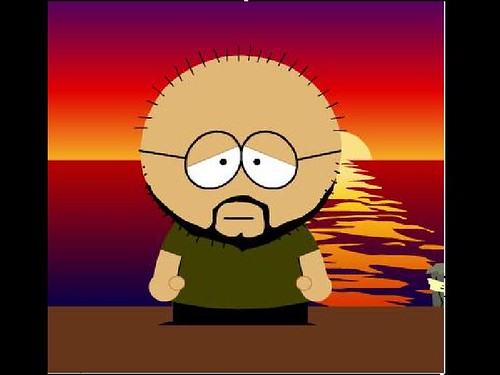
I noticed that a couple of blogs had pictures that looked like they came out of South Park so on a hunch I did a search, and found this site.. There are a decent number of options available (in terms of hair, expressions, clothing, props, etc.), but once you have the image you need to do a screen capture and manipulate it with some other program like Adobe. Anyway, enjoy.
